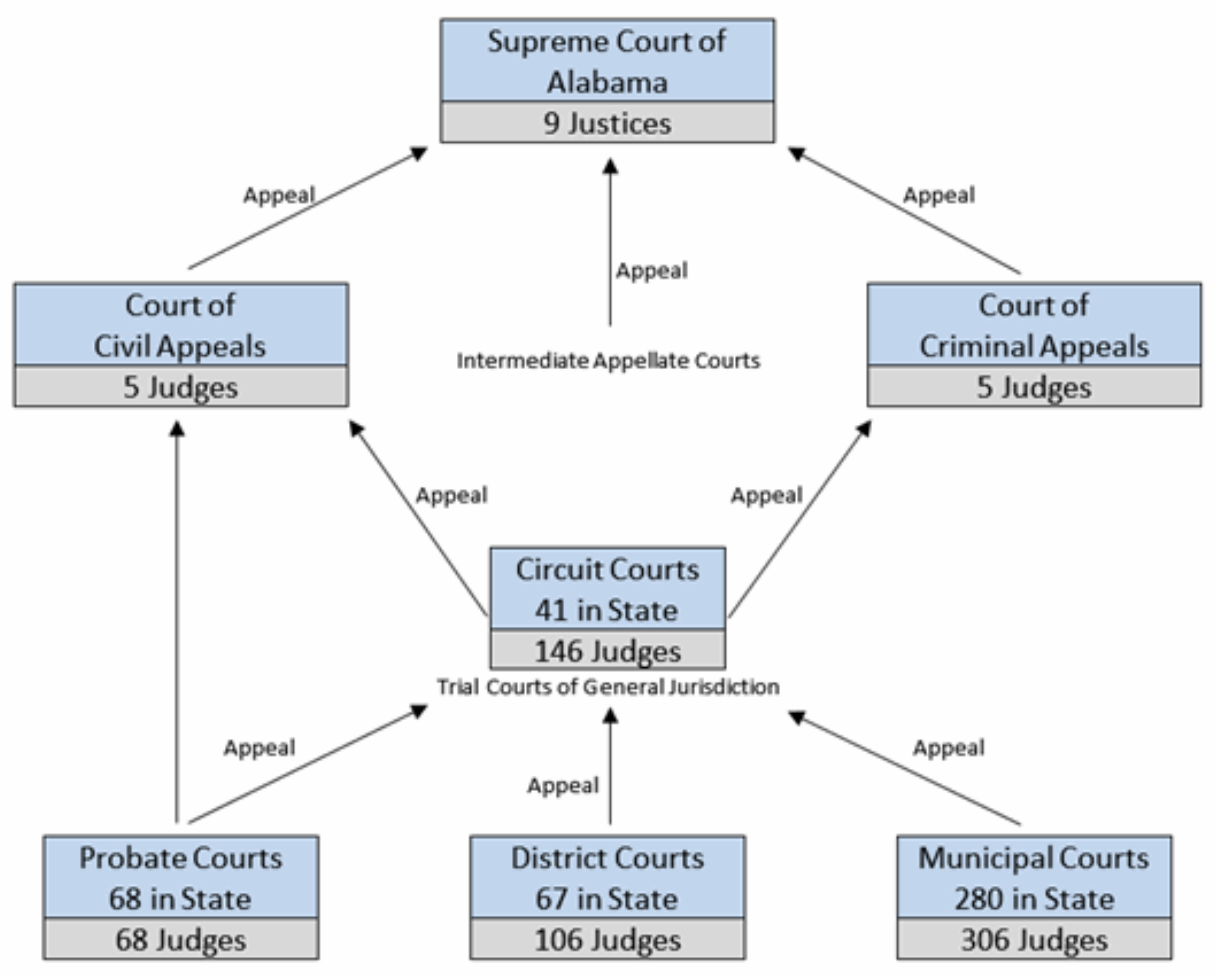
Learn about the state and federal courts that might be involved in your personal injury claim
You’ve been injured in an accident caused by someone else’s negligence. You know you want to sue this person for damages, but you have no idea where to file the lawsuit. What should you do?
In Alabama, most personal injury lawsuits will be filed in the circuit court located in the county where the defendant lives or where the accident occurred. However, there are certain situations in which you might file your lawsuit in an Alabama district court or even a federal court.
Let’s take a look at the ins and outs of the Alabama court system.

Alabama district courts
Alabama district courts handle civil cases where the dollar amount in question (i.e., the amount of damages you’re requesting from the defendant) is more than $6,000 but less than $20,000. District courts also have jurisdiction over criminal misdemeanors.
There are 67 district courts and 106 district court judges in Alabama. Every county in Alabama has a district court.
Each district court has a small claims court. The small claims court handles disputes where the dollar amount in question is less than $6,000. Small claims courts are simple, informal and inexpensive. Most parties are NOT represented by attorneys in a small claims court.
How do I file a lawsuit in small claims court?
Filing a lawsuit in small claims court is pretty straightforward. To do so, follow these steps:
- Go to court. Go to the small claims division of the district court in the county where the defendant (the person you want to sue) lives.
- File a complaint. File a Statement of Claim form (“complaint”). You’ll need to have some basic information to fill out the complaint, including the defendant’s address. You must also pay a filing fee at the time the complaint is filed. If you can’t afford a filing fee, you can fill out an Affidavit of Substantial Hardship form, and ask the judge to delay or forgive payment.
- Wait for a case number. Once the complaint is filed, the clerk will process the complaint and assign a case number (processing typically takes 1-2 weeks).
- Wait for service. After the complaint is processed, it will be sent to the Sheriff’s Department for service on the defendant.
- Wait for an answer. The defendant has 14 days to answer the complaint and to file their answer with the Small Claims Division.
- Trial. If the defendant files an answer, the case will be set for trial (roughly 6-8 weeks from the date the answer is filed). You should take this time to subpoena any witnesses and otherwise prepare your case for trial.
Alabama circuit courts
The majority of personal injury lawsuits are filed in Alabama’s circuit courts.
Circuit courts have general jurisdiction over all legal matters where the amount in dispute exceeds $6,000. Accordingly, circuit courts have jurisdiction over all matters filed in district court. What’s more, circuit courts have exclusive jurisdiction over matters in which the amount in dispute exceeds $20,000.
| Amount in dispute | Court |
|---|---|
| $0-$6,000 | Small claims court |
| $6,000-$20,000 | District court or circuit court |
| $20,000 or more | Circuit court |
Circuit courts hear all types of cases, including:
- Tort cases (car accidents, truck accidents, motorcycle accidents, etc.)
- Contract cases
- Property dispute cases
- Divorce cases
- Criminal cases
Circuit courts also have appellate jurisdiction over certain legal matters that may be appealed directly from small claims courts or district courts.
There are 67 counties in Alabama, which are divided into 41 judicial circuits.
The largest judicial circuit in the state is the 10th Judicial Circuit which encompasses Jefferson County and is the seat of 27 circuit court judges.
Circuit courts are much more formal than small claims courts (or even district courts). Parties are almost always represented by attorneys. What’s more, there are very strict rules of evidence and rules of civil procedure that must be followed.
Alabama Court of Civil Appeals
If you’re not happy with the decision reached in your circuit court case, you can appeal your case to the Alabama Court of Civil Appeals located in Montgomery, Alabama.
The court of civil appeals has jurisdiction over appeals in which the amount of controversy does not exceed $50,000.
The court also has jurisdiction over appeals in workers’ compensation cases and domestic relations cases, including annulment, divorce, alimony, child support, adoption and child custody cases.
There are 5 judges on the Alabama Court of Civil Appeals. They are elected in statewide elections to 6-year terms. A presiding judge is the administrative head of the court.
Supreme Court of Alabama
The Supreme Court of Alabama is the state’s highest court. It consists of a chief justice and 8 associate justices.
Your personal injury case will probably not be heard by the Supreme Court of Alabama. The Court has the authority to:
- Review decisions by all the lower courts of the state
- Determine matters over which no other court has jurisdiction
- Hear appeals in disputes exceeding $50,000
The Supreme Court of Alabama makes rules governing the administration, practice and procedures for Alabama’s courts.
Federal courts
There are 3 federal courts in Alabama:
- United States District Court for the Middle District of Alabama
- United States District Court for the Northern District of Alabama
- United States District Court for the Southern District of Alabama
Federal courts are courts of “limited jurisdiction” because they can ONLY hear the following types of cases:
- Cases that involve a violation of the U.S. Constitution or federal law
- Cases in which there is complete diversity
Chances are your personal injury lawsuit doesn’t involve the U.S. Constitution or a federal law (although it’s possible). It’s more likely that your case has “complete diversity.”
Complete diversity exists when:
- The plaintiff lives in a different state than the defendant, and
- The case in controversy (the total amount of damages claimed) is more than $75,000.
Just because your case can be filed in federal court doesn’t mean it has to be filed in federal court. You can choose, instead, to file in state court, though the opposing party might try to “remove” your case to federal court.
Choosing a venue for your personal injury case
Once you’ve figured out the appropriate court system, you need to decide the proper venue. The term “venue” refers to the geographic location of the court.
In other words, you may decide you need to file your case in circuit court, but the circuit court of which county?
In most personal injury lawsuits, you can file your lawsuit:
- In the county where the defendant lives, or
- In the county where the accident occurred
Let’s look at an example:
You’re involved in a car accident in Montgomery with a driver who was intoxicated. You decide to sue the intoxicated driver for $30,000.
You live in Washington County. The defendant lives in Tuscaloosa County.
Where can you file your personal injury lawsuit?
In the above scenario, you can either file your lawsuit in the Tuscaloosa County Circuit Court (where the defendant lives) or the Montgomery County Circuit Court (where the accident occurred).
You can’t file your lawsuit in federal court because you don’t have complete diversity, and no federal laws were violated. What’s more, you can’t file your lawsuit in small claims court (the amount in controversy exceeds $6,000) or district court (the amount in controversy exceeds $20,000).
Unfortunately, you can’t file your lawsuit in Washington County even though it’s where you live. This is because the Alabama venue rules (and the venue rules of all states) are concerned with making sure defendants can’t easily be dragged across the country by plaintiffs.
To make certain you file your lawsuit properly, consider contacting an Alabama personal injury attorney using our free Enjuris legal directory.
See our guide Choosing a personal injury attorney.

